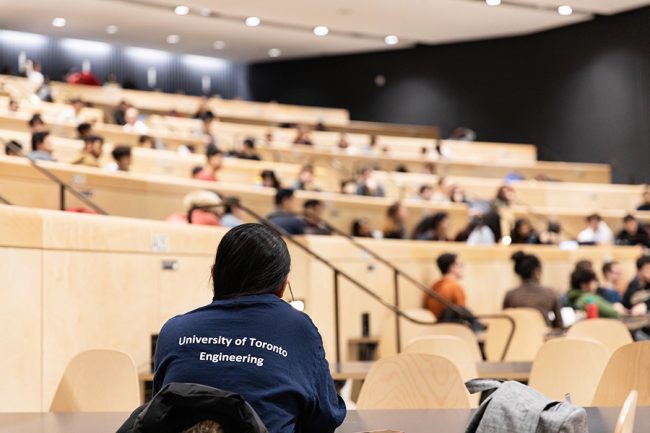
Starting in September 2023, U of T Engineering’s new certificate in Justice, Equity, Diversity and Inclusion in Engineering will enable undergraduate students to strengthen their knowledge of concepts such as ethics, equity, justice and the interactions between technology and society.
“Social justice continues to be of great concern around the world: how do we ensure that we build societies that are as fair as we can make them?” says Professor Dionne Aleman, Associate Dean of Cross-Disciplinary Programs at U of T Engineering.
“Some people might think that engineering, due to its technical nature, is somehow immune to issues of justice, equity, diversity and inclusion, but certainly it is not. Engineers, like everyone, are impacted by these issues, and they also have a direct impact on them through their work.”
To show how social issues are inextricably linked to the engineering ones, Aleman gives the example of siting a new water treatment plant.
“An engineer designing such a facility would consider the technical, economic and environmental factors. Social factors are very much part of that as well: how do your design decisions impact the communities who live near the site, versus those who are served by it? Are you considering the needs and concerns of those communities in fair balance?”
To earn the new certificate, students will enrol in three courses from an approved list. The courses are divided into three broad categories: equity and justice; technology and society; and ethics and broader considerations.
The courses are cross-disciplinary and are taught by professors from across the University of Toronto. Some are offered by divisions within the Faculty of Arts & Science, such as the Institute for the History & Philosophy of Science & Technology and the Women & Gender Studies Institute.
Other courses are offered by U of T Engineering’s Institute for Studies in Transdisciplinary Engineering Education & Practice, for example: TEP 324 Engineering and Social Justice or CME 259 Technology in Society and the Biosphere I.
“As the engineering student body becomes more diverse, a growing number of our incoming students want to be agents of social change, both for their own communities and for others,” says Mikhail Burke (MSE 1T2, BME PhD 1T8).
While serving as Associate Director, Access and Inclusive Pedagogy at U of T Engineering, Burke was one of the key architects of the new certificate. In January 2023, he became the Manager of Equity, Diversity and Inclusion at U of T’s Division of Student Life.
“Engineering has always been a sociotechnical process — it both exerts social influence and is also shaped by a variety of social factors. The certificate leans into this notion, providing students with an avenue to broach these intersectional topics in the classroom, where learning and discourse can be collaborative in nature. This is something our students value.”
“The Canadian engineering profession’s North Star is to protect society’s wellbeing — this is the value proposition and why engineering is a regulated profession,” says Marisa Sterling, P.Eng., Assistant Dean & Director, Diversity, Inclusion and Professionalism at U of T Engineering. Sterling is also a past president of Professional Engineers Ontario.
“Engineering work done poorly can harm the public, the environment and society’s welfare. And while engineering problems may be viewed as technical in nature, they all will have an ultimate human consequence. We discuss justice in engineering as there are injustices in society. To increase knowledge of these, their history and root causes, helps engineering students better define the problems they are trying to solve and therefore produces engineering solutions that positively consider more people.”
“This certificate encourages students to mirror a practice that all licensed professionals adhere to, which is undertaking continuing competency and seeking out continuous practice evaluation and knowledge in fulfilling their duty to public protection.”
By Tyler Irving
This story originally published by Engineering News